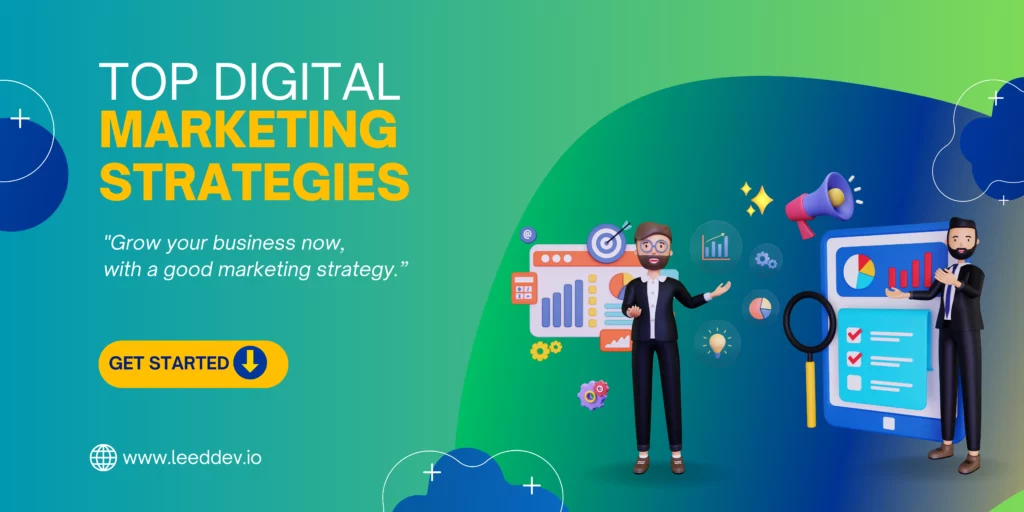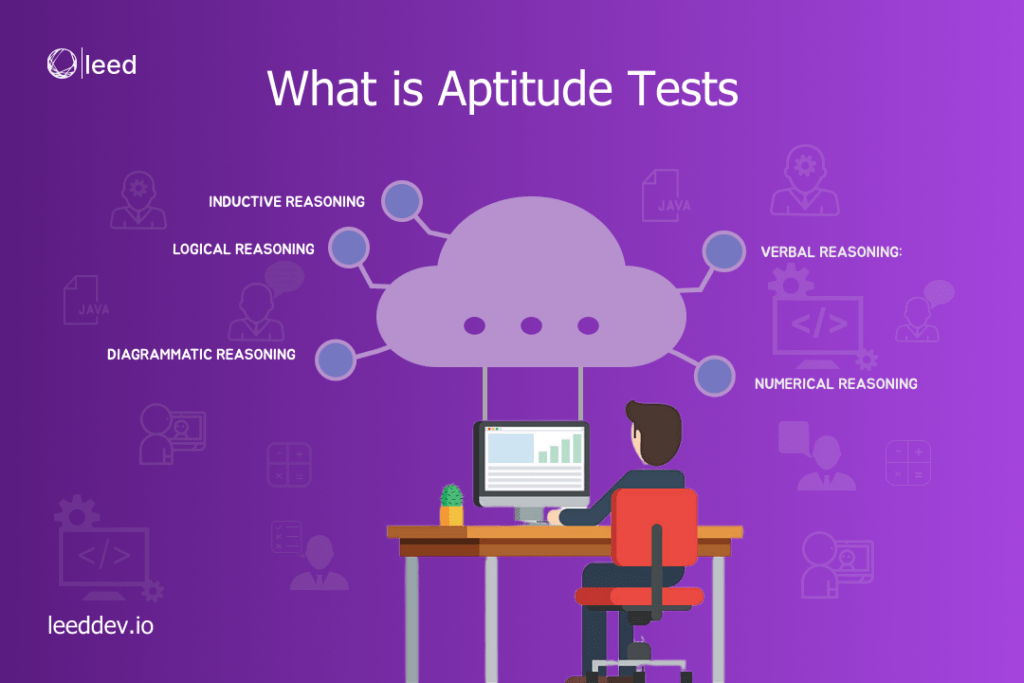Get ahead of the competition with proven digital marketing strategies. Our expert tips and tactics will help you drive traffic, increase conversions, and grow your business. As we move into 2023, the world of digital marketing continues to evolve and change at a rapid pace. From new technologies to shifting consumer behavior, various factors are impacting how businesses approach their marketing strategies.
You want to take your business to the next level. Right? If so, marketing strategies are a must!
What is Digital Marketing?
Digital marketing uses digital channels, such as social media, email, search engines, and websites. These social media channels are used to promote a product or a service. In today’s digital age, traditional marketing methods like print ads and billboards just won’t work. Instead, businesses must develop a comprehensive plan of various strategies to engage their audience online. These digital marketing strategies are essential for businesses looking to stay ahead of the competition in today’s world. Traditional marketing methods like print ads and billboards are no longer effective enough to reach customers.
Digital marketing provides organizations with a powerful way to grow their brand and achieve their marketing objectives. With the right effective marketing strategies, businesses can increase their visibility and drive more website traffic. In return, revenue will also be increased.
4 Ps of Marketing
The 4 points of marketing are also known as the marketing mix. The 4 Ps are the key elements that make up a marketing strategy. which are follows
Product
It refers to a product or service a business or organization offers its customers. It includes the design, features, and quality of the product. The packaging and branding are included as well.
Price
This refers to the amount potential customers have to pay for the product or service. Pricing strategies can vary depending on the competition, target market, and overall business goals.
Place
This is related to the distribution channels used to get the product or service to the customer. This includes retail stores, online sales, or a combination of both.
Promotion
The methods used to promote the product or service to the target audience are included in the promotion. This includes advertising, personal selling, sales promotion, and public relations.
Difference between Marketing Strategies and Marketing Plans
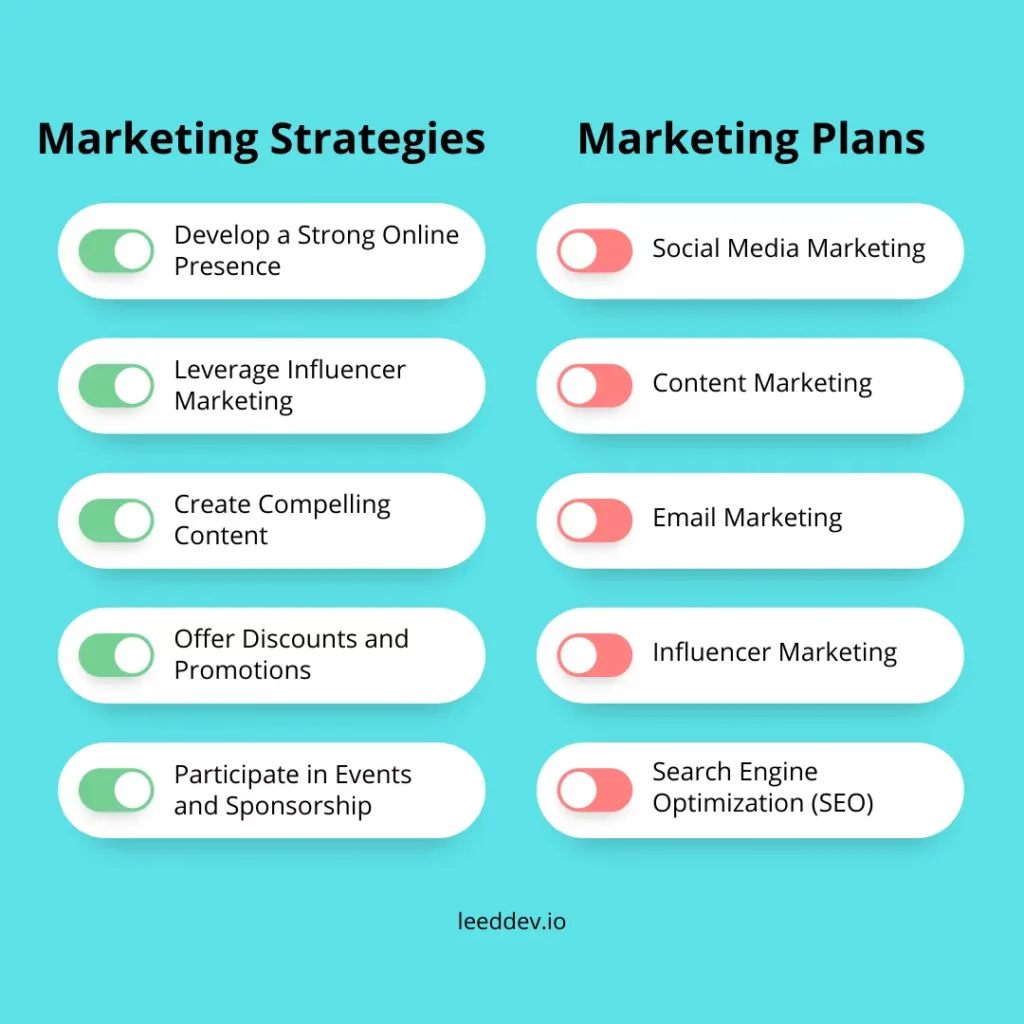
Marketing strategies and Marketing plans are both important components of a successful marketing campaign. But both have different scopes and roles.
Marketing Strategy
A marketing strategy refers to the approach and goals of your marketing efforts. It involves understanding the behaviors of your audience and developing a plan to reach them effectively. A marketing strategy is a high-level plan that outlines your overall marketing approach, including the tactics you will use. It also includes the resources you will allocate. It is developed over a longer time frame and focuses more on the big picture.
Marketing Plan
On the other hand, a marketing plan is a detailed, tactical document outlining the steps to execute the marketing strategy. It includes timelines, budgets, and the goals set out in your marketing strategy. A marketing plan is typically developed over a shorter time, such as a year. It is more focused on the day-to-day execution of your marketing efforts.
How to create a Digital Marketing Strategy?
Creating a marketing strategy is crucial for any business to effectively promote its services to its potential customers. Here are some steps which need to be followed when creating a marketing strategy:
Identify your Target Audience
Before you can create a successful marketing strategy, you need to identify who your target audience is. Research your audience’s demographics, interests, and behaviors. This will help you gain a deeper understanding of who they are and what motivates them.
Set your Goals
What do you want to achieve with your efforts? Do you want to increase drive sales, brand awareness, generate leads, or all of the above? Be specific about it and set measurable goals that will guide your marketing efforts.
Develop your Brand Positioning
Your brand positioning is what will set you apart from your competitors. You need to develop a unique value proposition. Your idea should communicate what makes your product or service different. You have to prove that your service is better than others in the market.
Marketing channels
Many different marketing channels are present from which you can choose according to your preferences. These include social media, content marketing, search engine optimization, email and advertising. Choose the channels that are best suited for reaching your target audience.
Create effective Messages and Content
Your messaging and content should be tailored to your potential customers. Your content should reflect your brand positioning. Develop a content calendar that outlines what you will post and when on each of your chosen marketing channels.
Budget
Setting your budget is the basic thing you need to do. Keep in mind your goals and calculate the potential risks. Determine how much you can spend on your marketing efforts and then allocate your budget according to it.
Analyze your results
Continuously monitor your results. Use data and analytics to track your progress. Check whether you are moving toward your marketing goals or not. Adjust your strategy as needed.
These steps can help create a comprehensive marketing strategy that effectively reaches your customers and drives results.
Why does Your Company Need Digital Marketing Strategies?
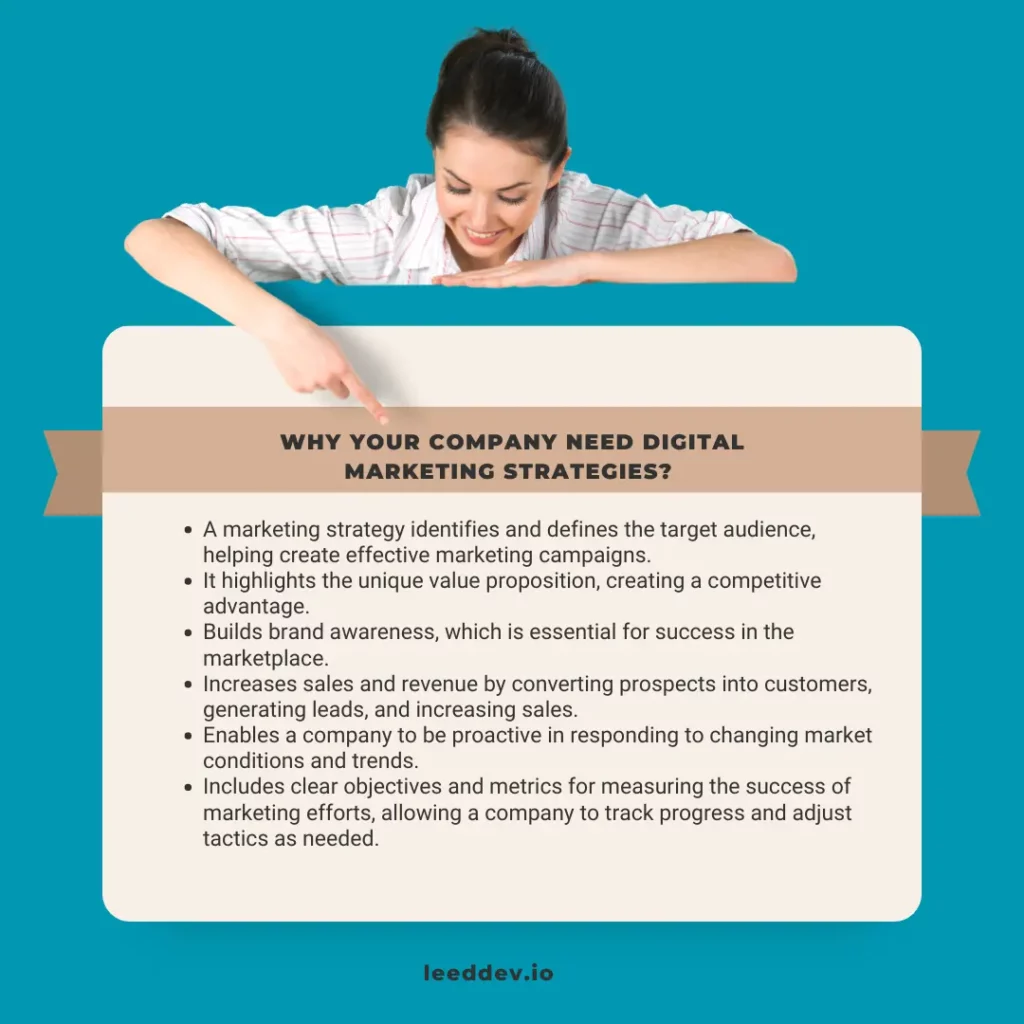
You need to have a proper marketing strategy. There are several reasons for it. Let’s discuss them in detail.
- A marketing strategy helps a company identify and define its target audience. This will help the organization create effective marketing campaigns that resonate with the right people.
- A marketing strategy will help you understand its unique value proposition. You need to have a strategy that is different from your competitors in the marketplace. This is important and will help you create a competitive advantage.
- Establishing brand awareness is a crucial factor that you need to consider. A marketing strategy helps a company build brand awareness.
- If you want to increase sales and revenue, you need to have a properly planned strategy. A well-executed marketing strategy will help you convert prospects into customers, generate leads, and increase sales and revenue.
- Marketing strategies allow a company to be proactive rather than reactive in responding to changing market conditions and trends. It will help adapt to the changing market conditions.
- A marketing strategy includes clear objectives and metrics for measuring the success of marketing efforts. It allows a company to track progress and adjust its marketing tactics as needed. It will help to measure the effectiveness of marketing efforts.
Marketing Benefits
There are numerous benefits to implementing digital marketing strategies in your business. Some of the key benefits of social media marketing include the following:
- Increased brand visibility
- Better targeting
- Greater cost-effectiveness
- Improved customer engagement
- Measurable results
- Competitive advantage
Top Digital Marketing Strategies
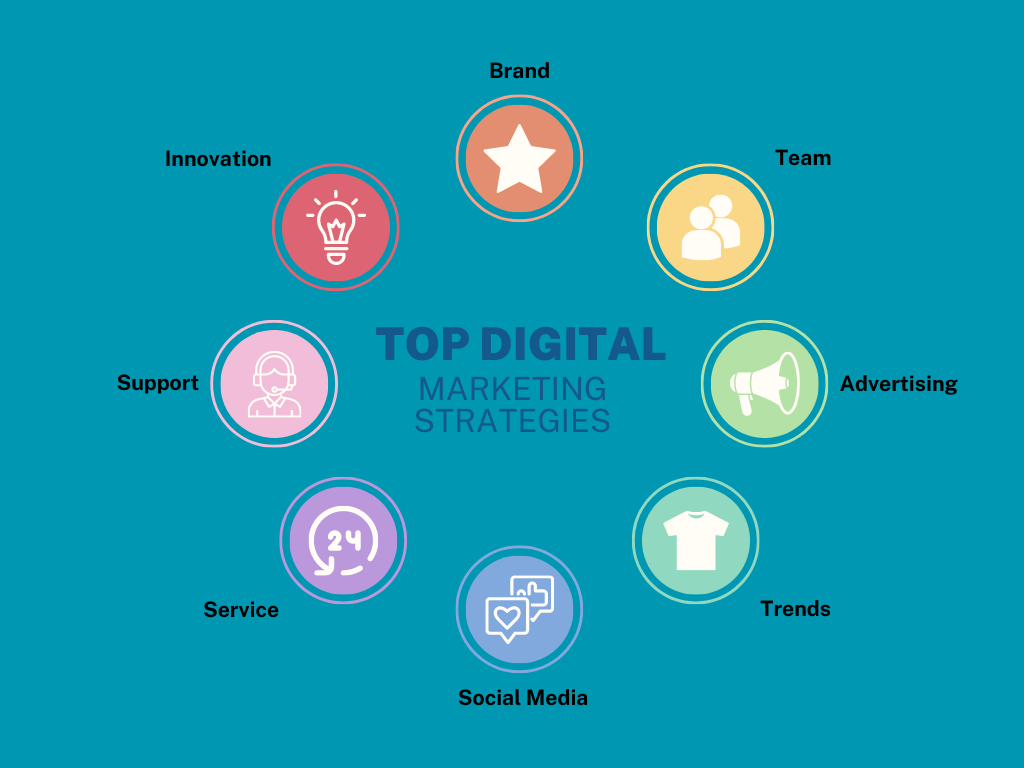
There are many different marketing strategies that businesses can use to reach and engage with their target audiences. Here are some of the top strategies:
Search Engine Optimization (SEO)
SEO involves optimizing your website and content to rank higher in search engine results pages. The aim is to drive more organic traffic to your site.
Pay-Per-Click (PPC) Advertising
In PPC, advertising ads are placed on search engines and social media platforms. The adviser has to pay the publisher for each click that the ad receives. This can be an effective way to drive traffic to your site.
Content Marketing
Content marketing involves creating and sharing high-quality content. This includes blog posts, videos, and infographics to build brand awareness and engage with customers. This will result in increased traffic to your website.
Social Media Marketing
Social media marketing involves using social media platforms such as Facebook, Twitter, and Instagram to connect with your target audience. It helps you build relationships and promote your products or services to your potential customers.
Email Marketing
It involves sending targeted, personalized emails to your subscribers to promote products or services and drive conversions.
Video Marketing
In Video marketing, users can create and share videos to promote their brand or products. These videos can be shared on social media, YouTube, and other video-sharing platforms. Video content is highly engaging and can be used to educate your audience and showcase your products or services.
Chatbots and Messaging Apps
Apps have become increasingly popular in recent years as a way to engage with customers. Chatbots are used to provide customer service, answer questions, and even make sales. Messaging apps can also be used to send personalized marketing messages and promotions directly to your customers.
Webinars and Podcasts
These popular digital marketing strategies allow businesses to engage with their audiences through educational content. Webinars can be used to provide product demos, in-depth training, or live events. These allow businesses to interact with their audiences in real time. In contrast, Podcasts can be used to share interview experts and industry insights or engagingly promote your brand.
Influencer Marketing
Influencer marketing involves partnering with influencers such as bloggers or social media personalities to promote your services to clients.
Mobile Marketing
Mobile marketing involves optimizing your website and marketing campaigns for mobile devices. This is done for the ease of people and to reach and engage with users.
These are just a few examples of the many marketing strategies that businesses can use. Each of these marketing strategies can be effective for your target audience. The key is to understand your audience and their preferences and to choose the right strategy.
Digital Marketing Facts
Now let’s discuss some interesting facts!
- In 2021, it was reported that over half of all internet traffic came from mobile devices. This highlights the importance of mobile optimization in marketing strategies.
- Video content has become increasingly important in marketing strategies in recent years. According to a report by HubSpot, 85% of businesses now use video as a marketing tool. It was predicted that video would account for 82% of all internet traffic by 2022.
- Personalization has become an important part of marketing strategies. It can help you to improve engagement and conversions. A study by Epsilon found that personalized emails have an open rate of 29% higher than non-personalized emails.
- Influencer marketing has become an increasingly popular way for brands to connect with audiences on social media. According to a report by Influencer Marketing Hub, “74% of consumers have spent up to $629 on a single purchase after being inspired by an influencer”.
- MediaKix published another statistic. According to this, 71% of companies believe that influencer marketing traffic is better than other sources. According to the companies, the customers from influencer campaigns were often more engaged. They were more likely to make a purchase than traffic from other channels.
Conclusion
In conclusion, digital marketing strategies have become essential to any business strategy in today’s world. With the rise of the internet and social media, it has become easier for businesses to reach their target audience. Now it’s easy for businesses to generate leads and increase brand awareness through digital marketing.
Digital marketing offers many opportunities, from search engine optimization to email marketing and paid advertising. These strategies can be adjusted according to a business’s specific needs and can provide measurable results.
By leveraging the power of digital marketing, businesses can reach a wider audience. However, it’s important to stay up-to-date with the latest trends to remain competitive in the ever-evolving digital world.
Overall, businesses that prioritize digital marketing as part of their overall marketing strategy are likely to see significant benefits. So, if you haven’t already, it’s time to embrace digital marketing! Don’t miss out on the incredible opportunities that digital marketing can offer your business. Start implementing these strategies today and watch your brand reach the heights of success.
FAQs
Q No.1 What are digital marketing basics?
Answer: The basics involve optimizing websites, utilizing SEO and PPC advertising, leveraging social media, creating valuable content, targeting mobile users, managing online reputation & much more.
Q No.2 What are the features of digital marketing?
Answer: The features of digital marketing include:
- Global Reach
- Precise Targeting of Potential Customers
- Cost-Effective Alternatives
- Measurable Results
- Personalization
- Interactivity
- Real-Time Engagement
- Flexibility and Adaptability
- Multimedia Capabilities
- Integration and Automation
Q No.3 How do I start digital marketing?
Answer: To start digital marketing, follow these steps:
- Define your goals
- Identify your target audience
- Establish your online presence
- Conduct market research
- Develop a digital marketing strategy
- Content creation
- Search engine optimization (SEO)
- Social media marketing
- Paid advertising
- Analytics and tracking
- Continuous learning and adaptation:
Q No.4 Is digital marketing easy?
Answer: Digital marketing is not necessarily hard to learn. The level of ease can vary depending on various factors like experience, knowledge, resources & the complexity of marketing goals.
Q No.5 What is a 5 step digital marketing strategy?
Answer: There are five essential steps for creating a digital marketing strategy:
- Identify your target audience
- Develop buyer personas
- Conduct a SWOT analysis
- Create SMART business goals
- Determine your budget.
Q No.6 What are the 5 R’s of digital marketing?
Answer: The 5 R’s of digital marketing are:
- Reach
- Relevance
- Resonance
- Reaction
- Return on investment (ROI).
Q No.7 What are the 4 C’s of digital marketing?
Answer: The 4 C’s of digital marketing are as follows:
- Customer value
- Convenience
- Communication
- Cost-efficiency.
Q No.8 What are the 4 E’s of digital marketing?
Answer: The 4Es of Marketing are
- Experience
- Everyplace
- Exchange
- Evangelism
Q No.9 What is digital marketing with an example?
Answer: Digital marketing refers to the use of digital channels and strategies to promote products, services, or brands to reach and engage with a target audience.
Example:
A clothing brand using social media platforms like Instagram and Facebook to showcase their latest fashion trends and engage with their target audience.
Q No.10 Can I teach myself digital marketing?
Answer: Yes, it is possible to teach yourself digital marketing. With the online resources, tutorials, and courses you can acquire the skills needed to implement digital marketing strategies
Q No.11 What are the benefits of digital marketing?
Answer: Digital marketing offers several benefits for businesses:
- Increased reach
- Cost-effective
- Targeted audience
- Measurable results
- Improved customer engagement
- Brand awareness and reputation
- Enhanced targeting and retargeting
- Flexibility and adaptability
- Integration with offline marketing
- Competitive advantage
Q No.12 What are the risks of digital marketing?
Answer: While digital marketing offers numerous benefits, it also carries certain risks that businesses should be aware of:
- Privacy concerns
- Cybersecurity threats
- Online reputation management
- Ad fraud and click fraud
- Ad-blocking and information overload
- Technical challenges
- Dependence on digital platforms
- Legal and regulatory compliance
Q No.13 What is the weakness of digital marketing?
Answer: While digital marketing has numerous strengths, it also has some potential weaknesses that businesses should be mindful of:
- Technical complexities
- Reliance on technology
- Digital divide
- Information overload
- Ad avoidance
- Fragmented audience
- Evolving algorithms and policies

